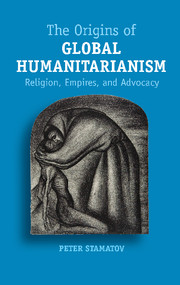Crossref Citations
This Book has been
cited by the following publications. This list is generated based on data provided by Crossref.
Stamatov, Peter
2014.
Beyond and against capitalism: abolitionism and the moral dimension of humanitarian practice.
International Social Science Journal,
Vol. 65,
Issue. 215-216,
p.
25.
Wilkinson, Iain
2014.
Editorial introduction: Understanding modern humanitarianism.
International Social Science Journal,
Vol. 65,
Issue. 215-216,
p.
7.
Wilkinson, Iain
2014.
The problem of understanding modern humanitarianism and its sociological value.
International Social Science Journal,
Vol. 65,
Issue. 215-216,
p.
65.
Brubaker, Rogers
2015.
Religious Dimensions of Political Conflict and Violence.
Sociological Theory,
Vol. 33,
Issue. 1,
p.
1.
Oloruntoba, Richard
and
Kovács, Gyöngyi
2015.
A commentary on agility in humanitarian aid supply chains.
Supply Chain Management: An International Journal,
Vol. 20,
Issue. 6,
p.
708.
Thornton, Arland
Dorius, Shawn F.
and
Swindle, Jeffrey
2015.
Developmental Idealism.
Sociology of Development,
Vol. 1,
Issue. 2,
p.
277.
Thornton, Arland
Dorius, Shawn F.
and
Swindle, Jeffrey
2015.
Developmental Idealism.
Sociology of Development,
Vol. 1,
Issue. 2,
p.
69.
Go, Julian
and
Krause, Monika
2016.
Fielding Transnationalism: An Introduction.
The Sociological Review,
Vol. 64,
Issue. 2_suppl,
p.
6.
Weller, Thomas
2016.
Humanity.
Vol. 110,
Issue. ,
p.
151.
Lamb-Books, Benjamin
2016.
Angry Abolitionists and the Rhetoric of Slavery.
p.
23.
Davies, Thomas R.
2016.
History of Transnational Voluntary Associations.
Voluntaristics Review,
Vol. 1,
Issue. 4,
p.
1.
Dromi, Shai M.
2016.
Soldiers of the Cross.
Sociological Theory,
Vol. 34,
Issue. 3,
p.
196.
Kyrou, Alexandros K.
2016.
From Russia with Love, from the West with Ambivalence: Orthodox Christian Relief during the Greek Revolution and the New Historiography on Humanitarian Intervention.
The Review of Faith & International Affairs,
Vol. 14,
Issue. 1,
p.
34.
Go, Julian
and
Krause, Monika
2016.
Fielding transnationalism: an introduction.
The Sociological Review Monographs,
Vol. 64,
Issue. 2,
p.
6.
Lamb-Books, Benjamin
2016.
Angry Abolitionists and the Rhetoric of Slavery.
p.
93.
Lamb-Books, Benjamin
2016.
Angry Abolitionists and the Rhetoric of Slavery.
p.
63.
Turner, Bryan S
2017.
Ritual, belief and habituation.
European Journal of Social Theory,
Vol. 20,
Issue. 1,
p.
132.
Grant, Kevin
2017.
Anti‐slavery, refugee relief, and the missionary origins of humanitarian photography ca. 1900–1960.
History Compass,
Vol. 15,
Issue. 5,
Adler, Gary J.
and
Offutt, Stephen
2017.
The Gift Economy of Direct Transnational Civic Action: How Reciprocity and Inequality Are Managed in Religious “Partnerships”.
Journal for the Scientific Study of Religion,
Vol. 56,
Issue. 3,
p.
600.
Wobbe, Theresa
2018.
Handbuch Religionssoziologie.
p.
383.





